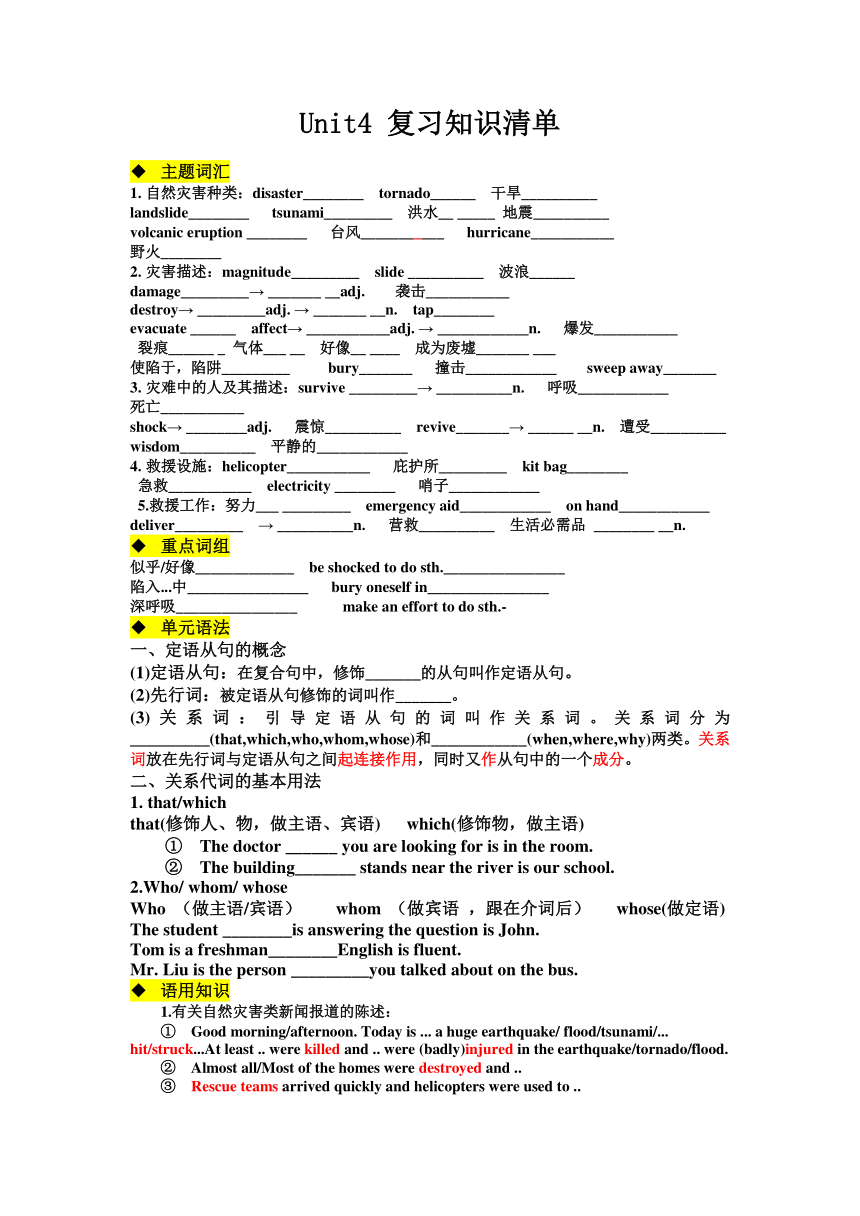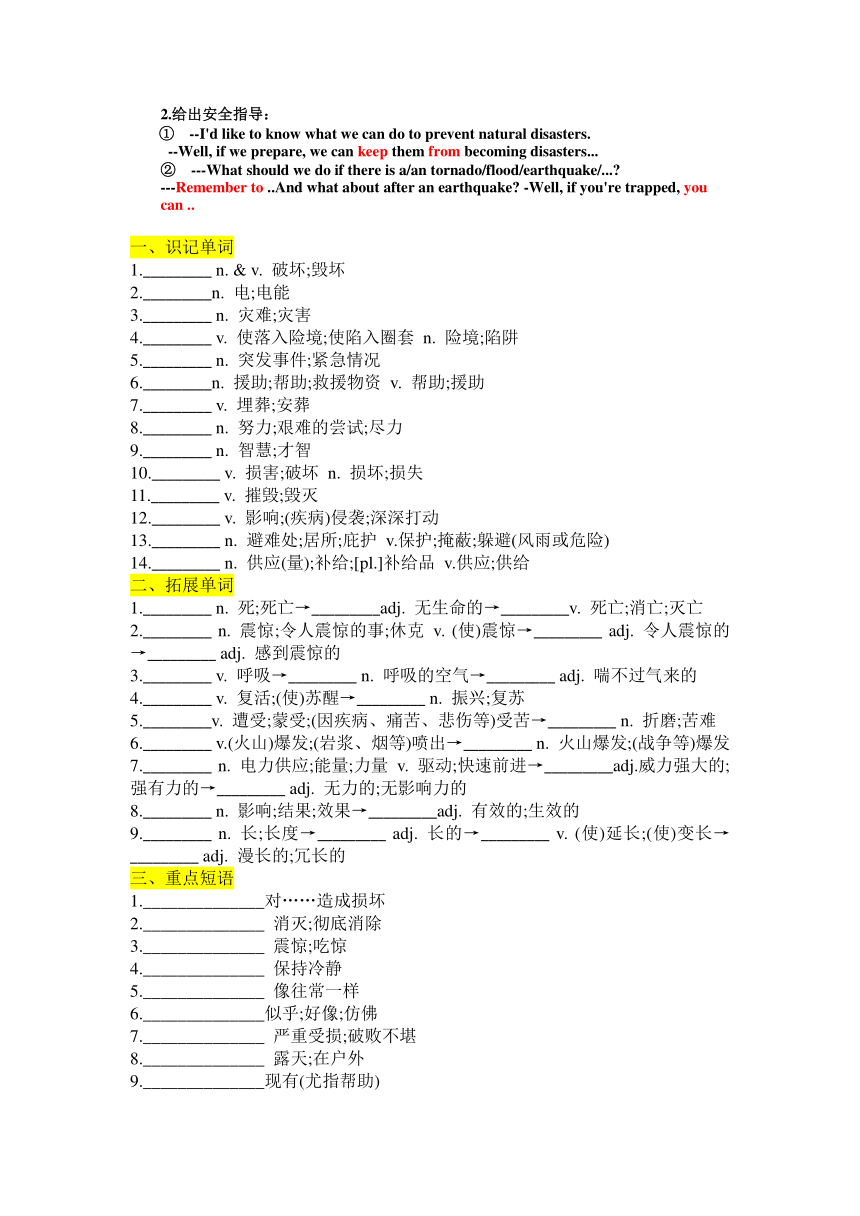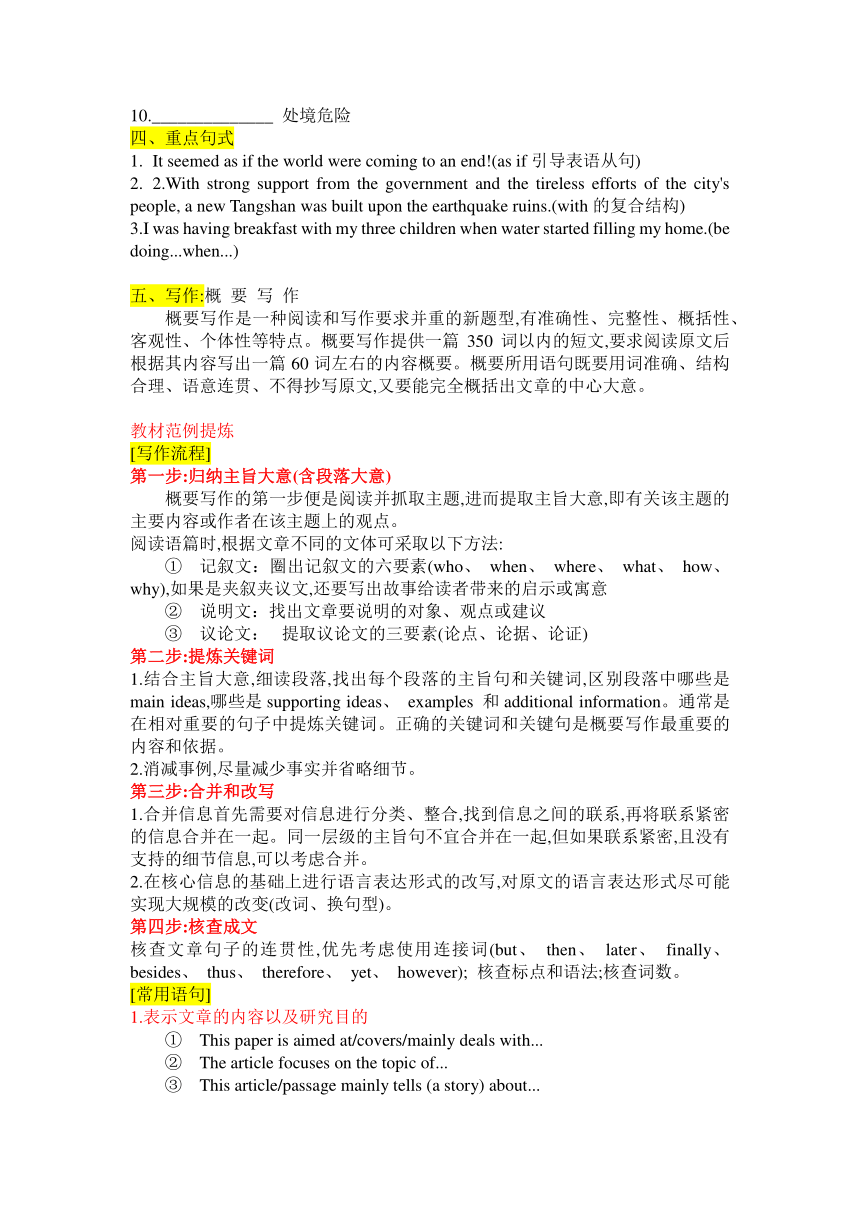人教版(2019)必修第一册Unit 4 Natural Disasters 知识点复习学案(无答案)
文档属性
| 名称 | 人教版(2019)必修第一册Unit 4 Natural Disasters 知识点复习学案(无答案) |  | |
| 格式 | docx | ||
| 文件大小 | 31.4KB | ||
| 资源类型 | 教案 | ||
| 版本资源 | 人教版(2019) | ||
| 科目 | 英语 | ||
| 更新时间 | 2025-01-13 13:51:43 | ||
图片预览



文档简介
Unit4 复习知识清单
主题词汇
自然灾害种类:disaster________ tornado______ 干旱__________
landslide________ tsunami_________ 洪水__ _____ 地震__________
volcanic eruption ________ 台风___________ hurricane___________
野火________
灾害描述:magnitude_________ slide __________ 波浪______
damage_________→ _______ __adj. 袭击___________
destroy→ _________adj. → _______ __n. tap________
evacuate ______ affect→ ___________adj. → ____________n. 爆发___________
裂痕______ _ 气体___ __ 好像__ ____ 成为废墟_______ ___
使陷于,陷阱_________ bury_______ 撞击____________ sweep away_______
灾难中的人及其描述:survive _________→ __________n. 呼吸____________
死亡___________
shock→ ________adj. 震惊__________ revive_______→ ______ __n. 遭受__________ wisdom__________ 平静的____________
救援设施:helicopter___________ 庇护所_________ kit bag________
急救___________ electricity ________ 哨子____________
5.救援工作:努力___ _________ emergency aid____________ on hand____________ deliver_________ → __________n. 营救__________ 生活必需品 ________ __n.
重点词组
似乎/好像_____________ be shocked to do sth.________________
陷入...中________________ bury oneself in________________
深呼吸________________ make an effort to do sth.-
单元语法
一、定语从句的概念
(1)定语从句:在复合句中,修饰_______的从句叫作定语从句。
(2)先行词:被定语从句修饰的词叫作_______。
(3)关系词:引导定语从句的词叫作关系词。关系词分为__________(that,which,who,whom,whose)和____________(when,where,why)两类。关系词放在先行词与定语从句之间起连接作用,同时又作从句中的一个成分。
二、关系代词的基本用法
1. that/which
that(修饰人、物,做主语、宾语) which(修饰物,做主语)
The doctor ______ you are looking for is in the room.
The building_______ stands near the river is our school.
2.Who/ whom/ whose
Who (做主语/宾语) whom (做宾语 ,跟在介词后) whose(做定语)
The student ________is answering the question is John.
Tom is a freshman________English is fluent.
Mr. Liu is the person _________you talked about on the bus.
语用知识
1.有关自然灾害类新闻报道的陈述:
Good morning/afternoon. Today is ... a huge earthquake/ flood/tsunami/... hit/struck...At least .. were killed and .. were (badly)injured in the earthquake/tornado/flood.
Almost all/Most of the homes were destroyed and ..
Rescue teams arrived quickly and helicopters were used to ..
2.给出安全指导:
--I'd like to know what we can do to prevent natural disasters.
--Well, if we prepare, we can keep them from becoming disasters...
---What should we do if there is a/an tornado/flood/earthquake/...
---Remember to ..And what about after an earthquake -Well, if you're trapped, you can ..
一、识记单词
1._________ n. & v. 破坏;毁坏
2._________n. 电;电能
3._________ n. 灾难;灾害
4._________ v. 使落入险境;使陷入圈套 n. 险境;陷阱
5._________ n. 突发事件;紧急情况
6._________n. 援助;帮助;救援物资 v. 帮助;援助
7._________ v. 埋葬;安葬
8._________ n. 努力;艰难的尝试;尽力
9._________ n. 智慧;才智
10._________ v. 损害;破坏 n. 损坏;损失
11._________ v. 摧毁;毁灭
12._________ v. 影响;(疾病)侵袭;深深打动
13._________ n. 避难处;居所;庇护 v.保护;掩蔽;躲避(风雨或危险)
14._________ n. 供应(量);补给;[pl.]补给品 v.供应;供给
二、拓展单词
1._________ n. 死;死亡→_________adj. 无生命的→_________v. 死亡;消亡;灭亡
2._________ n. 震惊;令人震惊的事;休克 v. (使)震惊→_________ adj. 令人震惊的→_________ adj. 感到震惊的
3._________ v. 呼吸→_________ n. 呼吸的空气→_________ adj. 喘不过气来的
4._________ v. 复活;(使)苏醒→_________ n. 振兴;复苏
5._________v. 遭受;蒙受;(因疾病、痛苦、悲伤等)受苦→_________ n. 折磨;苦难
6._________ v.(火山)爆发;(岩浆、烟等)喷出→_________ n. 火山爆发;(战争等)爆发
7._________ n. 电力供应;能量;力量 v. 驱动;快速前进→_________adj.威力强大的;强有力的→_________ adj. 无力的;无影响力的
8._________ n. 影响;结果;效果→_________adj. 有效的;生效的
9._________ n. 长;长度→_________ adj. 长的→_________ v. (使)延长;(使)变长→_________ adj. 漫长的;冗长的
三、重点短语
1.______________对……造成损坏
2.______________ 消灭;彻底消除
3.______________ 震惊;吃惊
4.______________ 保持冷静
5.______________ 像往常一样
6.______________似乎;好像;仿佛
7.______________ 严重受损;破败不堪
8.______________ 露天;在户外
9.______________现有(尤指帮助)
10.______________ 处境危险
四、重点句式
It seemed as if the world were coming to an end!(as if引导表语从句)
2.With strong support from the government and the tireless efforts of the city's people, a new Tangshan was built upon the earthquake ruins.(with的复合结构)
3.I was having breakfast with my three children when water started filling my home.(be doing...when...)
五、写作:概 要 写 作
概要写作是一种阅读和写作要求并重的新题型,有准确性、完整性、概括性、客观性、个体性等特点。概要写作提供一篇350词以内的短文,要求阅读原文后根据其内容写出一篇60词左右的内容概要。概要所用语句既要用词准确、结构合理、语意连贯、不得抄写原文,又要能完全概括出文章的中心大意。
教材范例提炼
[写作流程]
第一步:归纳主旨大意(含段落大意)
概要写作的第一步便是阅读并抓取主题,进而提取主旨大意,即有关该主题的主要内容或作者在该主题上的观点。
阅读语篇时,根据文章不同的文体可采取以下方法:
记叙文:圈出记叙文的六要素(who、 when、 where、 what、 how、 why),如果是夹叙夹议文,还要写出故事给读者带来的启示或寓意
说明文:找出文章要说明的对象、观点或建议
议论文: 提取议论文的三要素(论点、论据、论证)
第二步:提炼关键词
1.结合主旨大意,细读段落,找出每个段落的主旨句和关键词,区别段落中哪些是main ideas,哪些是supporting ideas、 examples 和additional information。通常是在相对重要的句子中提炼关键词。正确的关键词和关键句是概要写作最重要的内容和依据。
2.消减事例,尽量减少事实并省略细节。
第三步:合并和改写
1.合并信息首先需要对信息进行分类、整合,找到信息之间的联系,再将联系紧密的信息合并在一起。同一层级的主旨句不宜合并在一起,但如果联系紧密,且没有支持的细节信息,可以考虑合并。
2.在核心信息的基础上进行语言表达形式的改写,对原文的语言表达形式尽可能实现大规模的改变(改词、换句型)。
第四步:核查成文
核查文章句子的连贯性,优先考虑使用连接词(but、 then、 later、 finally、 besides、 thus、 therefore、 yet、 however); 核查标点和语法;核查词数。
[常用语句]
1.表示文章的内容以及研究目的
This paper is aimed at/covers/mainly deals with...
The article focuses on the topic of...
This article/passage mainly tells (a story) about...
This passage mainly deals with/discusses/explores...
This essay presents knowledge that...
This paper provides/gives an overview of...
In this passage (about...), the author...
The author began the essay/passage by telling/presenting...
First/Firstly/In the beginning/In the first part,the author argues/explains/mentions/states/points out (that)...
2.表示研究的结论
The result shows that...
The author finds that...
It is concluded that...
Finally/As a conclusion,the author concludes/adds/stresses that...
Finally, the author summarizes that...
3.表示观点或建议
The author suggests/considers that...
As far as the author is concerned...
In the author's view...
答案
主题词汇
自然灾害种类:disaster___灾害______ tornado__龙卷风_____ 干旱__drought_____ landslide_山体滑坡___ tsunami__龙卷风___ 洪水__ flood_____ 地震___earthquake__
volcanic eruption ___火山爆发_____ 台风___typhoon ____ hurricane___飓风_____
野火___wildfire______
灾害描述:magnitude__震级____ slide __滑落____ 波浪_wave ___
damage__损坏________→ ___damaged____ __adj. 袭击__strike____
destroy→ __destroyed_adj. → _destroyer___ __n. tap___轻扣__
evacuate _撤离___ affect→ __affected__adj. → ___effect_n. 爆发__erupt___
裂痕___crack ___ _ 气体___gas __ 好像__ as if____ 成为废墟__in ruins ___
使陷于,陷阱___ trap __ bury__埋葬_ 撞击__crash__ sweep away_冲走___
灾难中的人及其描述:survive __幸存____→ ___survivor____n. 呼吸__breathe ______
死亡__death______
shock→ __shocking/shocked __adj. 震惊__in shock ___ revive__复苏__→ _revival_ __n. 遭受__suffer_______ wisdom_智慧____ 平静的_ calm___
救援设施:helicopter___直升机_____ 庇护所___shelter ___ kit bag__工具____
急救__ first aid ____ electricity _电_____ 哨子__whistle__
5.救援工作:努力___ effort ____ emergency aid____急救____ on hand__现有的_____ deliver___派送_ → __delivery___n. 营救__rescue___ 生活必需品 ___supply __n.
重点词组
似乎/好像___as if________ be shocked to do sth._做某事感到震惊________
陷入...中____be trapped in________ bury oneself in_____专心于...___________
深呼吸____take a deep breath____ make an effort to do sth.___努力做...________
单元语法
一、定语从句的概念
(1)定语从句:在复合句中,修饰__名词或代词_____的从句叫作定语从句。
(2)先行词:被定语从句修饰的词叫作__先行词_____。
(3)关系词:引导定语从句的词叫作关系词。关系词分为__关系代词________(that,which,who,whom,whose)和___关系副词_________(when,where,why)两类。关系词放在先行词与定语从句之间起连接作用,同时又作从句中的一个成分。
二、关系代词的基本用法
1. that/which
that(修饰人、物,做主语、宾语) which(修饰物,做主语)
The doctor __that______ you are looking for is in the room.
The building__ that/which_____ stands near the river is our school.
2.Who/ whom/ whose
Who (做主语/宾语) whom (做宾语 ,跟在介词后) whose(做定语)
The student __who______is answering the question is John.
Tom is a freshman__whose_______English is fluent.
Mr. Liu is the person _who/whom________you talked about on the bus.
一、识记单词
1.ruin n. & v. 破坏;毁坏
2.electricity n. 电;电能
3.disaster n. 灾难;灾害
4.trap v. 使落入险境;使陷入圈套 n. 险境;陷阱
5.emergency n. 突发事件;紧急情况
6.aid n. 援助;帮助;救援物资 v. 帮助;援助
7.bury v. 埋葬;安葬
8.effort n. 努力;艰难的尝试;尽力
9.wisdom n. 智慧;才智
10.damage v. 损害;破坏 n. 损坏;损失
11.destroy v. 摧毁;毁灭
12.affect v. 影响;(疾病)侵袭;深深打动
13.shelter n. 避难处;居所;庇护 v.保护;掩蔽;躲避(风雨或危险)
14.supply n. 供应(量);补给;[pl.]补给品 v.供应;供给
二、拓展单词
1.death n. 死;死亡→dead adj. 无生命的→die v. 死亡;消亡;灭亡
2.shock n. 震惊;令人震惊的事;休克 v. (使)震惊→shocking adj. 令人震惊的→shocked adj. 感到震惊的
3.breathe v. 呼吸→breath n. 呼吸的空气→breathless adj. 喘不过气来的
4.revive v. 复活;(使)苏醒→revival n. 振兴;复苏
5.suffer v. 遭受;蒙受;(因疾病、痛苦、悲伤等)受苦→suffering n. 折磨;苦难
6.erupt v.(火山)爆发;(岩浆、烟等)喷出→eruption n. 火山爆发;(战争等)爆发
7.power n. 电力供应;能量;力量 v. 驱动;快速前进→powerful adj.威力强大的;强有力的→powerless adj. 无力的;无影响力的
8.effect n. 影响;结果;效果→effective adj. 有效的;生效的
9.length n. 长;长度→long adj. 长的→lengthen v. (使)延长;(使)变长→lengthy adj. 漫长的;冗长的
三、重点短语
1.do damage to 对……造成损坏
2.sweep away 消灭;彻底消除
3.in shock 震惊;吃惊
4.stay calm 保持冷静
5.as usual 像往常一样
6.as if 似乎;好像;仿佛
7.in ruins 严重受损;破败不堪
8.in the open air 露天;在户外
9.on hand 现有(尤指帮助)
10.in danger 处境危险
主题词汇
自然灾害种类:disaster________ tornado______ 干旱__________
landslide________ tsunami_________ 洪水__ _____ 地震__________
volcanic eruption ________ 台风___________ hurricane___________
野火________
灾害描述:magnitude_________ slide __________ 波浪______
damage_________→ _______ __adj. 袭击___________
destroy→ _________adj. → _______ __n. tap________
evacuate ______ affect→ ___________adj. → ____________n. 爆发___________
裂痕______ _ 气体___ __ 好像__ ____ 成为废墟_______ ___
使陷于,陷阱_________ bury_______ 撞击____________ sweep away_______
灾难中的人及其描述:survive _________→ __________n. 呼吸____________
死亡___________
shock→ ________adj. 震惊__________ revive_______→ ______ __n. 遭受__________ wisdom__________ 平静的____________
救援设施:helicopter___________ 庇护所_________ kit bag________
急救___________ electricity ________ 哨子____________
5.救援工作:努力___ _________ emergency aid____________ on hand____________ deliver_________ → __________n. 营救__________ 生活必需品 ________ __n.
重点词组
似乎/好像_____________ be shocked to do sth.________________
陷入...中________________ bury oneself in________________
深呼吸________________ make an effort to do sth.-
单元语法
一、定语从句的概念
(1)定语从句:在复合句中,修饰_______的从句叫作定语从句。
(2)先行词:被定语从句修饰的词叫作_______。
(3)关系词:引导定语从句的词叫作关系词。关系词分为__________(that,which,who,whom,whose)和____________(when,where,why)两类。关系词放在先行词与定语从句之间起连接作用,同时又作从句中的一个成分。
二、关系代词的基本用法
1. that/which
that(修饰人、物,做主语、宾语) which(修饰物,做主语)
The doctor ______ you are looking for is in the room.
The building_______ stands near the river is our school.
2.Who/ whom/ whose
Who (做主语/宾语) whom (做宾语 ,跟在介词后) whose(做定语)
The student ________is answering the question is John.
Tom is a freshman________English is fluent.
Mr. Liu is the person _________you talked about on the bus.
语用知识
1.有关自然灾害类新闻报道的陈述:
Good morning/afternoon. Today is ... a huge earthquake/ flood/tsunami/... hit/struck...At least .. were killed and .. were (badly)injured in the earthquake/tornado/flood.
Almost all/Most of the homes were destroyed and ..
Rescue teams arrived quickly and helicopters were used to ..
2.给出安全指导:
--I'd like to know what we can do to prevent natural disasters.
--Well, if we prepare, we can keep them from becoming disasters...
---What should we do if there is a/an tornado/flood/earthquake/...
---Remember to ..And what about after an earthquake -Well, if you're trapped, you can ..
一、识记单词
1._________ n. & v. 破坏;毁坏
2._________n. 电;电能
3._________ n. 灾难;灾害
4._________ v. 使落入险境;使陷入圈套 n. 险境;陷阱
5._________ n. 突发事件;紧急情况
6._________n. 援助;帮助;救援物资 v. 帮助;援助
7._________ v. 埋葬;安葬
8._________ n. 努力;艰难的尝试;尽力
9._________ n. 智慧;才智
10._________ v. 损害;破坏 n. 损坏;损失
11._________ v. 摧毁;毁灭
12._________ v. 影响;(疾病)侵袭;深深打动
13._________ n. 避难处;居所;庇护 v.保护;掩蔽;躲避(风雨或危险)
14._________ n. 供应(量);补给;[pl.]补给品 v.供应;供给
二、拓展单词
1._________ n. 死;死亡→_________adj. 无生命的→_________v. 死亡;消亡;灭亡
2._________ n. 震惊;令人震惊的事;休克 v. (使)震惊→_________ adj. 令人震惊的→_________ adj. 感到震惊的
3._________ v. 呼吸→_________ n. 呼吸的空气→_________ adj. 喘不过气来的
4._________ v. 复活;(使)苏醒→_________ n. 振兴;复苏
5._________v. 遭受;蒙受;(因疾病、痛苦、悲伤等)受苦→_________ n. 折磨;苦难
6._________ v.(火山)爆发;(岩浆、烟等)喷出→_________ n. 火山爆发;(战争等)爆发
7._________ n. 电力供应;能量;力量 v. 驱动;快速前进→_________adj.威力强大的;强有力的→_________ adj. 无力的;无影响力的
8._________ n. 影响;结果;效果→_________adj. 有效的;生效的
9._________ n. 长;长度→_________ adj. 长的→_________ v. (使)延长;(使)变长→_________ adj. 漫长的;冗长的
三、重点短语
1.______________对……造成损坏
2.______________ 消灭;彻底消除
3.______________ 震惊;吃惊
4.______________ 保持冷静
5.______________ 像往常一样
6.______________似乎;好像;仿佛
7.______________ 严重受损;破败不堪
8.______________ 露天;在户外
9.______________现有(尤指帮助)
10.______________ 处境危险
四、重点句式
It seemed as if the world were coming to an end!(as if引导表语从句)
2.With strong support from the government and the tireless efforts of the city's people, a new Tangshan was built upon the earthquake ruins.(with的复合结构)
3.I was having breakfast with my three children when water started filling my home.(be doing...when...)
五、写作:概 要 写 作
概要写作是一种阅读和写作要求并重的新题型,有准确性、完整性、概括性、客观性、个体性等特点。概要写作提供一篇350词以内的短文,要求阅读原文后根据其内容写出一篇60词左右的内容概要。概要所用语句既要用词准确、结构合理、语意连贯、不得抄写原文,又要能完全概括出文章的中心大意。
教材范例提炼
[写作流程]
第一步:归纳主旨大意(含段落大意)
概要写作的第一步便是阅读并抓取主题,进而提取主旨大意,即有关该主题的主要内容或作者在该主题上的观点。
阅读语篇时,根据文章不同的文体可采取以下方法:
记叙文:圈出记叙文的六要素(who、 when、 where、 what、 how、 why),如果是夹叙夹议文,还要写出故事给读者带来的启示或寓意
说明文:找出文章要说明的对象、观点或建议
议论文: 提取议论文的三要素(论点、论据、论证)
第二步:提炼关键词
1.结合主旨大意,细读段落,找出每个段落的主旨句和关键词,区别段落中哪些是main ideas,哪些是supporting ideas、 examples 和additional information。通常是在相对重要的句子中提炼关键词。正确的关键词和关键句是概要写作最重要的内容和依据。
2.消减事例,尽量减少事实并省略细节。
第三步:合并和改写
1.合并信息首先需要对信息进行分类、整合,找到信息之间的联系,再将联系紧密的信息合并在一起。同一层级的主旨句不宜合并在一起,但如果联系紧密,且没有支持的细节信息,可以考虑合并。
2.在核心信息的基础上进行语言表达形式的改写,对原文的语言表达形式尽可能实现大规模的改变(改词、换句型)。
第四步:核查成文
核查文章句子的连贯性,优先考虑使用连接词(but、 then、 later、 finally、 besides、 thus、 therefore、 yet、 however); 核查标点和语法;核查词数。
[常用语句]
1.表示文章的内容以及研究目的
This paper is aimed at/covers/mainly deals with...
The article focuses on the topic of...
This article/passage mainly tells (a story) about...
This passage mainly deals with/discusses/explores...
This essay presents knowledge that...
This paper provides/gives an overview of...
In this passage (about...), the author...
The author began the essay/passage by telling/presenting...
First/Firstly/In the beginning/In the first part,the author argues/explains/mentions/states/points out (that)...
2.表示研究的结论
The result shows that...
The author finds that...
It is concluded that...
Finally/As a conclusion,the author concludes/adds/stresses that...
Finally, the author summarizes that...
3.表示观点或建议
The author suggests/considers that...
As far as the author is concerned...
In the author's view...
答案
主题词汇
自然灾害种类:disaster___灾害______ tornado__龙卷风_____ 干旱__drought_____ landslide_山体滑坡___ tsunami__龙卷风___ 洪水__ flood_____ 地震___earthquake__
volcanic eruption ___火山爆发_____ 台风___typhoon ____ hurricane___飓风_____
野火___wildfire______
灾害描述:magnitude__震级____ slide __滑落____ 波浪_wave ___
damage__损坏________→ ___damaged____ __adj. 袭击__strike____
destroy→ __destroyed_adj. → _destroyer___ __n. tap___轻扣__
evacuate _撤离___ affect→ __affected__adj. → ___effect_n. 爆发__erupt___
裂痕___crack ___ _ 气体___gas __ 好像__ as if____ 成为废墟__in ruins ___
使陷于,陷阱___ trap __ bury__埋葬_ 撞击__crash__ sweep away_冲走___
灾难中的人及其描述:survive __幸存____→ ___survivor____n. 呼吸__breathe ______
死亡__death______
shock→ __shocking/shocked __adj. 震惊__in shock ___ revive__复苏__→ _revival_ __n. 遭受__suffer_______ wisdom_智慧____ 平静的_ calm___
救援设施:helicopter___直升机_____ 庇护所___shelter ___ kit bag__工具____
急救__ first aid ____ electricity _电_____ 哨子__whistle__
5.救援工作:努力___ effort ____ emergency aid____急救____ on hand__现有的_____ deliver___派送_ → __delivery___n. 营救__rescue___ 生活必需品 ___supply __n.
重点词组
似乎/好像___as if________ be shocked to do sth._做某事感到震惊________
陷入...中____be trapped in________ bury oneself in_____专心于...___________
深呼吸____take a deep breath____ make an effort to do sth.___努力做...________
单元语法
一、定语从句的概念
(1)定语从句:在复合句中,修饰__名词或代词_____的从句叫作定语从句。
(2)先行词:被定语从句修饰的词叫作__先行词_____。
(3)关系词:引导定语从句的词叫作关系词。关系词分为__关系代词________(that,which,who,whom,whose)和___关系副词_________(when,where,why)两类。关系词放在先行词与定语从句之间起连接作用,同时又作从句中的一个成分。
二、关系代词的基本用法
1. that/which
that(修饰人、物,做主语、宾语) which(修饰物,做主语)
The doctor __that______ you are looking for is in the room.
The building__ that/which_____ stands near the river is our school.
2.Who/ whom/ whose
Who (做主语/宾语) whom (做宾语 ,跟在介词后) whose(做定语)
The student __who______is answering the question is John.
Tom is a freshman__whose_______English is fluent.
Mr. Liu is the person _who/whom________you talked about on the bus.
一、识记单词
1.ruin n. & v. 破坏;毁坏
2.electricity n. 电;电能
3.disaster n. 灾难;灾害
4.trap v. 使落入险境;使陷入圈套 n. 险境;陷阱
5.emergency n. 突发事件;紧急情况
6.aid n. 援助;帮助;救援物资 v. 帮助;援助
7.bury v. 埋葬;安葬
8.effort n. 努力;艰难的尝试;尽力
9.wisdom n. 智慧;才智
10.damage v. 损害;破坏 n. 损坏;损失
11.destroy v. 摧毁;毁灭
12.affect v. 影响;(疾病)侵袭;深深打动
13.shelter n. 避难处;居所;庇护 v.保护;掩蔽;躲避(风雨或危险)
14.supply n. 供应(量);补给;[pl.]补给品 v.供应;供给
二、拓展单词
1.death n. 死;死亡→dead adj. 无生命的→die v. 死亡;消亡;灭亡
2.shock n. 震惊;令人震惊的事;休克 v. (使)震惊→shocking adj. 令人震惊的→shocked adj. 感到震惊的
3.breathe v. 呼吸→breath n. 呼吸的空气→breathless adj. 喘不过气来的
4.revive v. 复活;(使)苏醒→revival n. 振兴;复苏
5.suffer v. 遭受;蒙受;(因疾病、痛苦、悲伤等)受苦→suffering n. 折磨;苦难
6.erupt v.(火山)爆发;(岩浆、烟等)喷出→eruption n. 火山爆发;(战争等)爆发
7.power n. 电力供应;能量;力量 v. 驱动;快速前进→powerful adj.威力强大的;强有力的→powerless adj. 无力的;无影响力的
8.effect n. 影响;结果;效果→effective adj. 有效的;生效的
9.length n. 长;长度→long adj. 长的→lengthen v. (使)延长;(使)变长→lengthy adj. 漫长的;冗长的
三、重点短语
1.do damage to 对……造成损坏
2.sweep away 消灭;彻底消除
3.in shock 震惊;吃惊
4.stay calm 保持冷静
5.as usual 像往常一样
6.as if 似乎;好像;仿佛
7.in ruins 严重受损;破败不堪
8.in the open air 露天;在户外
9.on hand 现有(尤指帮助)
10.in danger 处境危险
